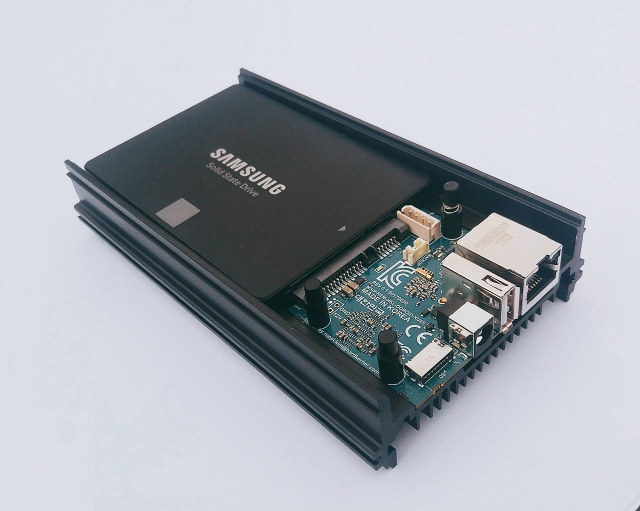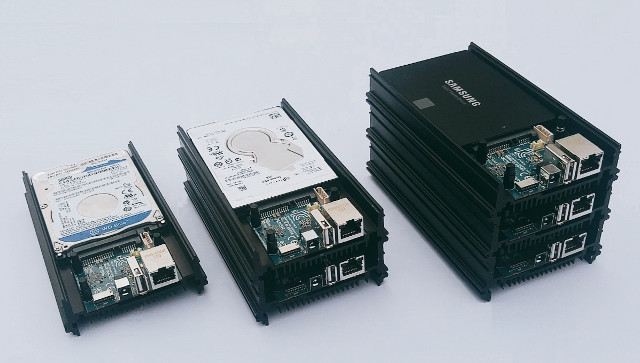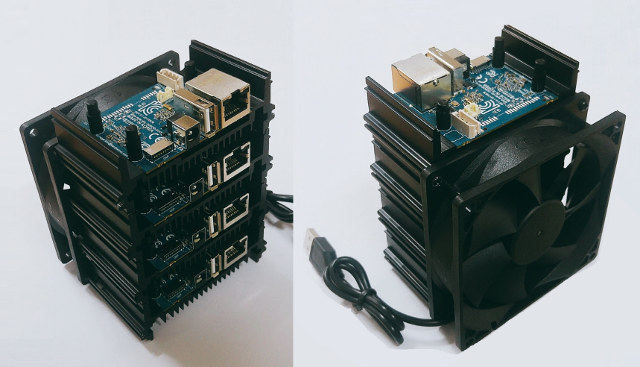Hardkernel ODROID-XU4 board is a powerful – yet inexpensive – ARM board based on Exynos 5422 octa-core processor that comes with 2GB RAM, Gigabit Ethernet, and a USB 3.0 interface which makes it suitable for networked storage applications. But the company found out that many of their users had troubles because of bad USB cables, and/or poorly designed & badly supported USB to SATA bridge chipsets. So they started to work on a new board called ODROID-HC1 (HC = Home Cloud) based on ODROID-XU4 design to provide a solution that’s both easier to ease and cheaper, and also includes a metal case and space for 2.5″ drives.

They basically remove all unneeded features from ODROID-XU4 such as HDMI, eMMC connector, USB 3.0 hub, power button, slide switch, etc… The specifications for ODROID-HC1 kit with ODROID-XU4S board should look like:
- SoC – Samsung Exynos 5422 quad core ARM Cortex-A15 @ 2.0GHz quad core ARM Cortex-A7 @ 1.4GHz with Mali-T628 MP6 GPU supporting OpenGL ES 3.0 / 2.0 / 1.1 and OpenCL 1.1 Full profile
- System Memory – 2GB LPDDR3 RAM PoP
- Storage – Micro SD slot up to 64GB + SATA interface via JMicron JMS578 USB 3.0 to SATA bridge chipset
- Network Connectivity – 10/100/1000Mbps Ethernet (via USB 3.0)
- USB – 1x USB 2.0 port
- Debugging – Serial console header
- Power Supply
- 5V via power barrel
- 12V unpopulated header for future 3.5″ designs [Update: ODROID-HC2 is in the works, to be released in November 2017]
- “Backup” header for battery for RTC
- Dimensions & weight – TBD
Exynos 5422 SoC comes with two USB 3.0 interfaces and one USB 2.0 interface, and since USB 3.0 interfaces are used for Ethernet and SATA, that’s why they only exposed a USB 2.0 port externally. The metal frame supports 2.5″ SATA HDD or HDD up to 15 mm thick, and it also used as a heatsink for the processor. The company tested various storage devices including Seagate Barracuda 2 TB/5 TB HDDs, Samsung 500 GB HDD and 256 GB SSD, Western Digital 500 GB and 1 TB HDD, HGST 1TB HDD with UAS and S.M.A.R.T. function.
 The fun part is that you can easily stack several ODROID-HC1 kits on top of each other, and you could use Ceph filesystem (Ceph FS), if you want the stacked boards to show as one logical volume [Update: This may not work well due to lack of RAM and 32-bit processor, see comments’ section]. The price is not too bad either, as ODROID-HC1 is slated to launch on August 21st for $49 + shipping with the board and metal frame.
The fun part is that you can easily stack several ODROID-HC1 kits on top of each other, and you could use Ceph filesystem (Ceph FS), if you want the stacked boards to show as one logical volume [Update: This may not work well due to lack of RAM and 32-bit processor, see comments’ section]. The price is not too bad either, as ODROID-HC1 is slated to launch on August 21st for $49 + shipping with the board and metal frame.
But the company did not stop there, as they found out it was rather time-consuming to setup a 200 ODROID-XU4 cluster in order to test Linux kernel 4.9 stability, and also designed a ODROID-MC1 (MC = My Cluster) cluster with 4 boards, a metal frame and a large USB powered heatsink.

The solution is based on the same ODROID-XU4S boards, minus the SATA parts. It’s also stackable, so building that 200 board cluster should be much easier and faster to do. The solution is expected to start selling for $200 around the middle of September, and on the software side some forum members are working on Docker-Swarm. Hardkernel is also interested in sending samples to people who have cluster computing experience.
Thanks to Nobe for the tip.

Jean-Luc started CNX Software in 2010 as a part-time endeavor, before quitting his job as a software engineering manager, and starting to write daily news, and reviews full time later in 2011.
Support CNX Software! Donate via cryptocurrencies, become a Patron on Patreon, or purchase goods on Amazon or Aliexpress




